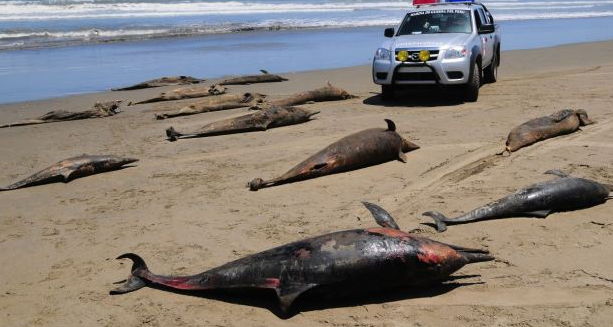جمعية الانقاذ البحرى وحماية البيئة بمصر تطالب بالتحقيق فى كارثة نفوق اكثر من ثلاث الاف دولفين فى بيرو
جمعية الانقاذ البحرى وحماية البيئة بمصر تطالب بالتحقيق فى كارثة نفوق اكثر من ثلاث الاف دولفين فى بيرو
Over 3000 Dolphins Found Dead on the Coast of Peru

Along just one stretch of coastline in Peru, more than 3,000 dead dolphins have washed ashore in just the last 3 months, and the disturbing trend may only be escalating.
With the latest discovery of 481 lifeless dolphins there in recent days, residents have begun to demand an explanation for the mysterious mass deaths — and as far as enlisted experts can tell, offshore oil exploration in the region is the most likely culprit.
According to a report from Peru 21, local fishermen in Lambayeque, north Peru, were first to notice the inexplicable rise in dead dolphin appearing on shore — averaging roughly 30 per day.
While such mass orca strandings are not entirely uncommon, or fully understood, Peruvian biologist Carlos Yaipen of the Scientific Organization for Conservation of Aquatic Animals says activity from petroleum companies in the nearby waters is to blame in this instance.
Yaipen believes that a controversial technique for detecting oil beneath the seabed, using sonar or acoustic sensing, is leading the death of marine life en masse.
“The oil companies use different frequencies of acoustic waves and the effects produced by these bubbles are not plainly visible, but they generate effects later in the animals. That can cause death by acoustic impact, not only in dolphins, but also in marine seals and whales.”
In 2003, scientists from the Zoological Society of London discovered that underwater sonar can lead to the formation of microscopic bubbles of nitrogen in the bloodstream and vital organs of aquatic mammals, afflicting the animals with a lethal condition commonly known as the Bends.
Additionally, low-range acoustic sensors are suspected to cause disorientation and internal bleeding to exposed wildlife.
As of this writing, Peruvian authorities have yet to identify the company whose activities may be leading to this grim toll on native marine life.
According to Offshore Magazine, a trade publication of petroleum news, at least one entity, Houston-based oil company BPZ Energy, has been actively surveying the seabed along the coast of Peru since the beginning of the year.
Source: Treehugger



تعليقات
إرسال تعليق